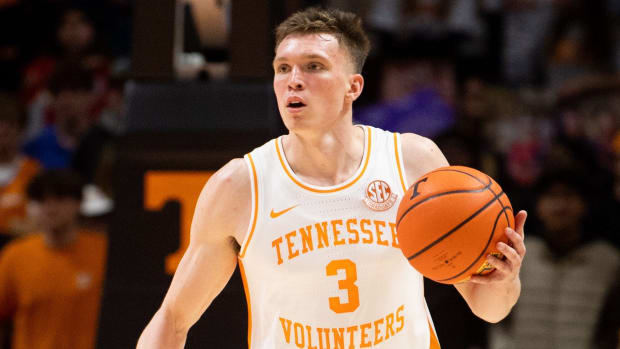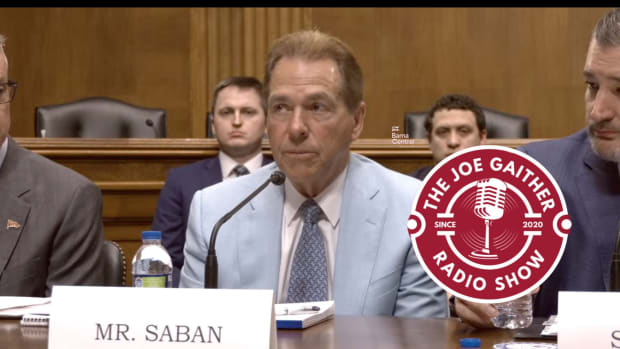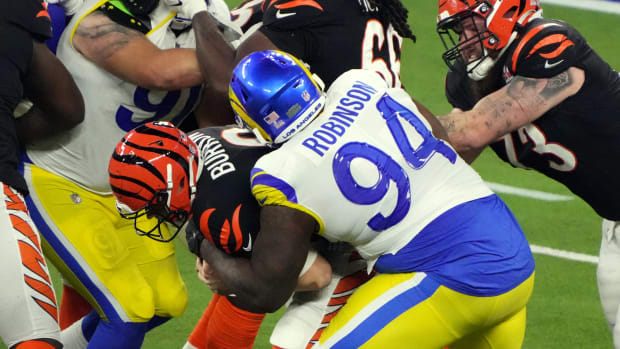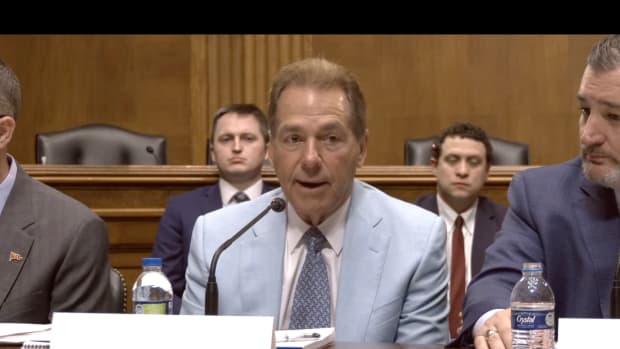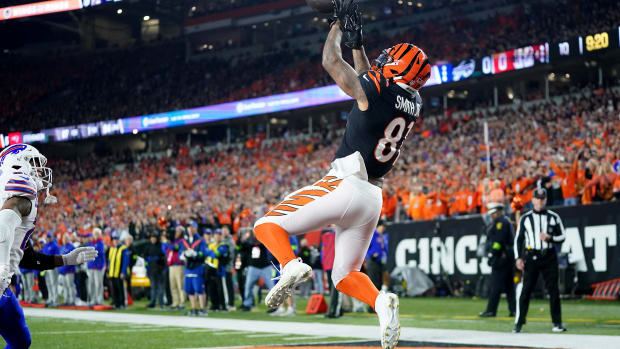Why Pete Golding Feels Different Entering his Fifth Season at Alabama
TUSCALOOSA, Ala. — Throughout Nick Saban's 15 years as the Alabama head coach, only four assistant coaches have been on his staff for five consecutive seasons.
Current defensive coordinator Pete Golding is one of those four as he enters his fifth season with the Crimson Tide this year joining longtime running backs coach Burton Burns, Kirby Smart and Bobby Williams in the somewhat exclusive club.
Now, a quick glance at Alabama's official team photo, which was released on Sunday, will show that Saban has well beyond the 10 people listed on the coaching staff that work under him in Tuscaloosa. Some of the most important off field roles, like trainers and nutritionists, have spent more than five years under Saban along with dozens of graduate assistants and analysts. Some assistants, like Sal Sunseri, have transitioned to other roles on his staff.
But it's a little different for those 10 on the coaching staff. There is often the opportunity to move on to bigger or better things as growing a branch on the Saban coaching tree only improves a coach's stock. Look at the number of former Saban assistants currently serving as head coaches at some of the top programs in college football like Florida, Michigan State, Texas A&M, Miami and Texas among others.
Now that Golding is crossing into the five-year threshold, it puts him in a rare position. He is familiar with the players, the place and the system. Back in December prior to Alabama's College Football Playoff semifinal game against Cincinnati, Golding said he was in "no rush" to become a head coach. Both Golding and offensive coordinator Bill O'Brien addressed the media on Sunday as their annual regular season media availability, and the always high-energy coach seemed especially excited for this year's group.
"It’s a new year," Golding said. "I think the guys that are in that room, the D.J. Dales, the Will Andersons, the Henry To’oTo’os, I think they remember the last 15 minutes of football they played, and that’s not how we wanted it to be.
"The bottom line, we didn’t get it done when we needed to. We couldn’t stop the run when we needed to. I think that’s still in their guts. When they come to work every day we want them to remember that feeling just as we remember that feeling and that’s up to us how we practice as a team so we prepare the right way so we don’t feel that again."
The Crimson Tide finished seventh in the country last season in total defense, but 18th in scoring defense at 20.1 points per game. Alabama actually outgained Georgia in the national title loss, but the Bulldogs scored 20 unanswered points in the fourth quarter to win 33-18. (The final seven points came on a pick six thrown by Alabama quarterback Bryce Young.)
Last season at the beginning of fall camp, Golding emphasized re-establishing the Alabama standard on defense. This year, one of his main points was that for the first time in the five years he's been with the program, he truly feels that he has leadership on every level of the defense.
Starting up front with Dale, Justin Eboigbe and Byron Young, before moving to Anderson on the edge, to To'oTo'o in the middle and rounding it out with Jordan Battle and DeMarcco Hellams on the back end, not only is this defense talented, but experienced.
An outspoken leader on last year's team and captain as a true sophomore that is now embracing the role even further as an upperclassmen is Anderson. According to Golding and Saban, his individual accomplishments last season have not affected the way he's preparing for this year.
"He came in hungry, preparing the right way and I think Coach [Saban] uses this term ‘relentless discontent,'" Golding said. "That’s who Will is. So regardless of what individual accolade he gets and all the praise he gets from you guys and all that, it doesn’t change who Will is. Will shows up every day with the same mindset. ‘I’m going to outwork everybody else. I am going to prepare harder than everybody else and I’m going to improve my craft.’
"So I don’t have to put expectations on Will. He has his own. He’s the hardest on himself. He’s different from everybody else. He doesn’t let the noise get to him. He’s trying to be the best football player he can be and he’s trying to bring people with him. And that’s a daily job for him that he looks forward to.”
Throughout the offseason, Saban has talked about how nice it is to have both coordinators back this season and the value of continuity. Golding is always spoken highly of by his players, and Saban commended his ability to build relationships with the players.
"I think continuity is important," Saban said. "I think it's important for players in relationships that they have, respect and trust that they develop in the people who are trying to help them be successful. Coaching is teaching. Teaching is ability to inspire learning, so to have that respect and trust, I think, is beneficial for all players."
At just 38 years old, Golding is nearly half the age of his boss and still considered relatively young for the industry. On Sunday, Saban referred to new tight ends coach Joe Cox as "brightest young guys that we've seen in a while," and Cox is 35.
Golding grew up in a football family with his dad as a high school football coach and has spent his whole life around the game. Even though he's young, he has now been in the coaching industry for more than 15 years after immediately jumping into the field after his playing days ended at Delta State.
At Alabama alone, Golding has been part of three SEC championships (2018, 2020 and 2021) and a national title (2020), so he knows what it takes for a team and defense to be successful. One of those keys is leadership, and he feels like the 2022 team has just the right balance.
"Every good team that I’ve been around is player run," Golding said. "Obviously in everything we do, here’s the expectation and here’s the standard but if the people under you aren’t upholding that or pushing the people around them too, you’re not going to get what you want. So I think it’s huge that it’s spread on both sides of the ball. I think a lot of times you see certain teams where it's loaded on one side — I’m not saying from a talent standpoint — I’m saying from a leadership standpoint, one side slips.
"I think this is a unique team where we have leadership in the right spots on both sides of the ball that is important to them. They do it the right way and they bring people to them. So it has to come inside out, and not always top down."

